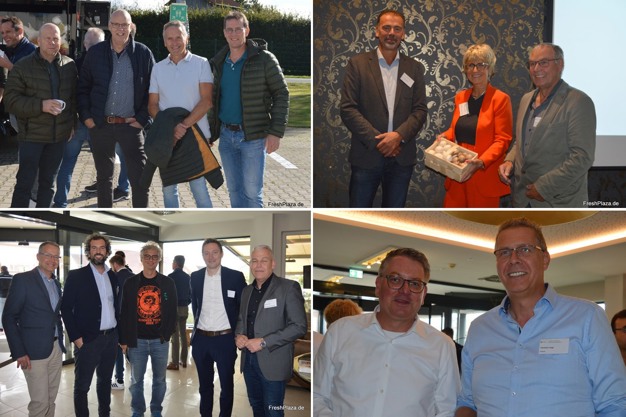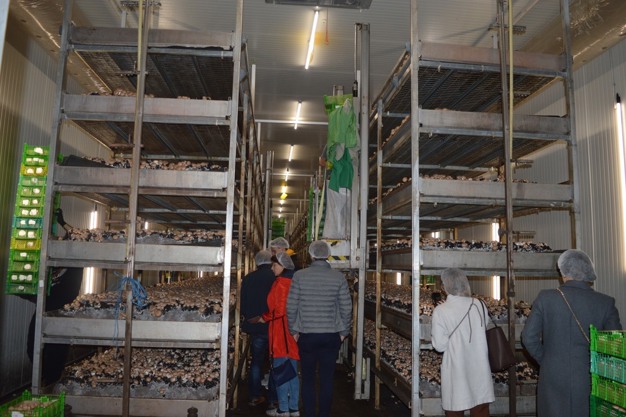The cultivated mushroom sector is currently facing numerous challenges, from the shortage of skilled labour to the issue of peat substitutes and sustainable mushroom packaging. This was demonstrated at this year's BDC Annual Conference, the leading industry meeting for the German mushroom sector, in Lohne, Lower Saxony. As usual, participants from near and far were treated to a mixed supporting programme full of presentations from industry suppliers and the everyday practice of mushroom cultivation. On Saturday, the mushroom-growing company OM Pilze, which is based in nearby Goldenstedt and belongs to the ELO Group, invited participants to visit its premises.
Click here to go to the photo report from the BDC Annual Conference.
Distortion of competition in Europe
The annual general meeting of the BDC took place in the morning. In the first part of the public lecture event, participants were provided an insight into the Healthy Mushrooms consumer campaign, and there was also a detailed look back at the ESSMI/HLP trip to China in the spring of 2024. The afternoon began with a speech by the new ZVG President Eva Kähler-Theuerkauf, who became the first woman in history to head the horticultural umbrella organisation just over a week ago. German horticulture is diverse, and the cultivated mushroom sector is certainly part of that, said Kähler-Theuerkauf. "The general conditions in horticulture as a whole are currently particularly challenging, and we are clearly seeing a distortion of competition in Europe. We will continue to fight against this at a political level," she said, referring to the high minimum wages in Germany compared to other European countries.

Participants at the BDC annual conference. Clockwise: The team from Wankum Champignons; the BDC Board with ZVG President Kähler-Theuerkauf; Jan-Bernd Krümpelbeck (ELO eG) and Christian Vogt (Pilzland); representatives of packaging suppliers Elbe-Label, Magic Pack and Saica Flex.
Progress in the field of peat replacement
This was followed by two presentations on peat replacement, a particularly sensitive topic in the mushroom industry. This is because peat-based soil is to be largely replaced in commercial horticulture by 2030. Around 80 per cent of topsoil consists of black peat, which is difficult to replace due to its excellent properties. "So we won't be able to avoid black peat in the coming years," said Eric Philipsen from Legro. Although the leading potting soil manufacturer has large peat fields in the Baltic region, which means that sufficient raw materials are available for the coming transition years, it is also working on new alternatives. In February of this year, Futuro cover soil based on Champost was launched and the initial results are particularly promising.
BVB-Kekkilä has also launched an alternative on the market. Last year, 800 hectares of reed cultivation areas were created in Finland. Research is currently being conducted into the optimal use in growing media and the first minimum viable products are already suitable for the production of ornamental and bedding plants, said Guido Linders from Kekkilä-BVB. "Above all, it is important that we all work together and that the entire value chain is involved. After all, the sustainable management of mushroom cultivation is in the interests of everyone involved."
'Exemption regulation needed for mushroom packaging'
Later in the afternoon, representatives from the packaging companies Saica-Flex and Magic Pack GmbH addressed the topic of mushroom packaging. They have been working on the 'ideal' packaging solution for cultivated mushrooms for many years, but the topic is now more important than ever in the wake of the packaging regulation. "There have already been attempts to sell mushrooms loose, which in turn has led to gigantic markdowns. Similar attempts with trays and cardboard lids have also failed, as retailers did not find it hygienic. Forgoing plastic and thus a practical implementation of the Packaging Ordinance is and remains problematic for sensitive goods such as mushrooms. That's why we have to fight for an exemption," said the BDC Chairman.

Participants at the BCD annual conference were provided an insight into organic mushroom cultivation at Goldenstedter Bio-Pilze.
Modern mushroom cultivation in Oldenburger Münsterland
The company OM Pilze, host of this year's annual conference, invited participants to the traditional company tour on the final day. Founded in 2010, the company has expanded several times over the past decade and has also had a separate organic division called Goldenstedter Bio-Pilze for two years now. Marketing takes place exclusively via the leading producer cooperative ELO eG, based in Langförden-Vechta. Sustainability is a top priority at the up-and-coming mushroom farm, emphasised company boss Matthias Surmann in his company presentation. Over the years, the site has been gradually equipped with state-of-the-art PV systems and a combined heat and power plant.
Click here to go directly to the complete photo report from the BDC Annual Conference.
For more information:
www.der-champignon.de
